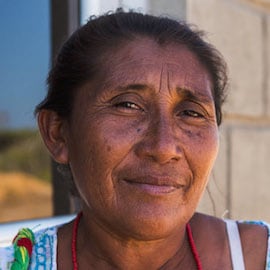Our Obsession with ‘Systems Change’ Leaves Marginalized Women Vulnerable – Let’s Empower Them to Advocate for Themselves
In December 2018, while driving on a highway through rural Uganda, I was in a car accident. After a drunk man ran into the road, our car overturned and landed in a tree — leaving me with severe lacerations and several broken bones in the left side of my face. I was fortunate that my husband and 14-month-old who were in the car with me were both unharmed. My husband quickly flagged down a passerby who took us to the district’s regional referral hospital.
Thankful that our accident had happened in the vicinity of a newly renovated district referral hospital, my husband made the choice to take me to this facility — which is supposed to provide specialized care to more than 400,000 individuals residing in Mityana District where our accident had occurred, and which is a top-tier facility in Uganda’s health care system. After carrying me into the main lobby, he was met with a stark reality: There was no doctor, the nurses explained that there were no medications, and even the basics like gauze and sutures had been out of stock for months. My husband was able to run to a nearby pharmacy, buy gauze and sutures, pay the nurses to stitch me up, and hire a private ambulance to make a 6-hour journey through rush hour traffic to the private hospital in the capital city of Kampala that ultimately saved my life.
But when the reality of the care we had received sank in, so did a harsh realization — for hundreds of thousands of Ugandan women, and women in rural areas globally, this was the facility they were referred to for their most pressing health care needs. Regional referral hospitals are not only supposed to have a chief medical officer and doctor on staff at all times, they are expected to have an operating room equipped for emergency surgeries, and are the last available line of comprehensive obstetric care. Women are told throughout their pregnancies to save money in case they need to rush to this very referral hospital for an emergency cesarean section, or due to hemorrhaging after delivery — yet with the facility lacking even a band aid, it’s up to women and their families to advocate and fight for the care they are entitled to. And this could ultimately cost women’s lives.
Equipping women to thrive in the ‘now’
Back in July 2018, I wrote about my experience founding KadAfrica — a social enterprise that works with girls who have dropped out of school to establish their own passion fruit farming cooperatives. We provide girls with land, inputs, tools and knowledge to start their farms. At the same time, these girls go through our year-long proprietary life skills, sexual reproductive health and rights (SRHR), savings and entrepreneurship curriculum so that they can become healthy and empowered decision makers, while earning an income to turn their dreams into reality. It was an honor to learn on the day I was released from the hospital in Uganda, that my piece on ethnocentric bias within the social impact crowd had been recognized as one of NextBillion’s 12 most influential posts of 2018; it was equally exciting to be invited back to write a follow-up piece for the By Women, For Women series. In doing so I have realized how my own experience within the Ugandan health care system has pushed me to recognize my bias, and challenged how KadAfrica can best prepare the young women with whom we work to operate within the system as it currently exists. We were guilty, I realized, of teaching our girls the importance of antenatal care and how it is best practice to keep an emergency savings so that, if needed, they could get transport and care at a Health Center IV or Regional Referral Hospital. While it’s likely that this advice is necessary, it’s also simply not enough.
Among my fellow social entrepreneurs who have fundraised within the social impact sector, we often remark within our circles how we are constantly being asked about how we approach systems change. Often time it feels as though donors and investors value larger systems change over the daily effects a program or enterprise has on a beneficiary’s life — even though both components are equally important. The ultimate goal is to shift the health care system in Uganda to provide better care, particularly for young women needing reproductive and maternal health care. But this leads to a key question: Have we become so obsessed with changing the system that we have forgotten that millions of women live every day without the know-how or voice to advocate for themselves? Yes, systemic change is the larger goal — but in the decades this takes to achieve, how might we better equip women at the bottom of the pyramid (and spanning the socioeconomic spectrum) to advocate for the simple care, empathy and human dignity they are entitled to in order to save lives now?
Learning to survive the current system
Since the accident, I have returned to my hometown in Northern California, and have had three follow-up surgeries at Stanford Hospital. And while I now have access to the world’s best care, what has been most fascinating to me is that the fight is not limited to Uganda. From the world’s poorest, most rural hospitals to its world class research institutions, one theme becomes clear — individuals have to fight for what they are entitled to, and this disproportionately affects women and people of color. Even in America, black women are three to four times more likely to die from pregnancy-related complications than white women. From pushing doctors to listen to and properly address symptoms, to fighting insurance companies and social services agencies to cover basic care, you must know that you can advocate for yourself – and know how to do it effectively – to get the full spectrum of care deserved.
On the opposite end of the spectrum from the girls we work with at KadAfrica, I also think of the experience of tennis star Serena Williams, who experienced a pulmonary embolism after giving birth by C-section. Having experienced this before, she knew to push her doctor, what tests to ask for, and ultimately advocated for herself to save her own life. Williams explained that had she not known her body as well as she did or advocated for doctors to listen to her, she might not be here today, noting “It may be time for women to be comfortable with having uncomfortable conversations.”
Social entrepreneurs, as well as both for-profit and nonprofit organizations working within maternal and SRHR, need to shift the narrative. We need to move from a myopic focus on last-mile service delivery of basic and palliative care or larger system change, to teaching marginalized populations the power of voice — what to expect, what to demand and why it is OK to reject the status quo. In that way, we can help them survive the systems as it currently exists.
At KadAfrica, we have resolved to incorporate this advocacy into our curriculum offering. Previously, we had a small advocacy component where we sensitized girls on the power of political participation: how to identify key issues and influencers, and how hold a community event. But we realized this stopped short of helping these young women to understand the true power of their voice, and also to know that it is OK to ask tough questions — particularly when it comes to their health.
Further, beyond teaching girls about Uganda’s health care system and SHRH resources/referrals available to them, we want girls and their families to know that sometimes the system doesn’t behave as planned. And we want them to understand that this can often be overcome by advocating for themselves more, and feeling confident in speaking up and pushing back when needed. To help girls learn how to use their voices, we are offering each KadAfrica girl the ability to apply for a Community Advocacy Event microgrant. With these grants, they will be able to plan and budget for an advocacy event around health and SRHR, and reach out to members of their communities to both speak out and let others know it is OK to do so. No matter how good we believe the system to be, or how much we believe we can change it, fostering powerful voices capable of having difficult conversations saves lives — and perhaps holds the ultimate key to fundamental systemic change.
Rebecca Kaduru co-founded KadAfrica in 2012.
Photo courtesy of Friends of the Earth International.
- Categories
- Health Care, Social Enterprise



